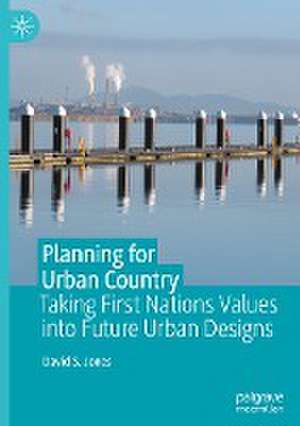Planning for Urban Country: Taking First Nations Values into Future Urban Designs
Autor David S. Jonesen Limba Engleză Hardback – 24 dec 2023
Preț: 731.59 lei
Preț vechi: 892.19 lei
-18% Nou
Puncte Express: 1097
Preț estimativ în valută:
140.01€ • 144.64$ • 116.52£
140.01€ • 144.64$ • 116.52£
Carte tipărită la comandă
Livrare economică 26 martie-09 aprilie
Preluare comenzi: 021 569.72.76
Specificații
ISBN-13: 9789819971916
ISBN-10: 9819971918
Ilustrații: XXIX, 309 p. 29 illus. in color.
Dimensiuni: 148 x 210 mm
Greutate: 0.56 kg
Ediția:1st ed. 2023
Editura: Springer Nature Singapore
Colecția Palgrave Macmillan
Locul publicării:Singapore, Singapore
ISBN-10: 9819971918
Ilustrații: XXIX, 309 p. 29 illus. in color.
Dimensiuni: 148 x 210 mm
Greutate: 0.56 kg
Ediția:1st ed. 2023
Editura: Springer Nature Singapore
Colecția Palgrave Macmillan
Locul publicării:Singapore, Singapore
Cuprins
1. Planning for Country.- 2. Designing with Country.- 3. Aboriginal Heritage and Place.- 4. Speaking Djilang: Past Present Future.- 5. Saving Mt Anakie / Anakie Youang.- 6. The Djilang Incubator.- 7. Geelong Arts Centre Project.- 8. Barwon Heads Road Duplication Project.- 9. Coriayo Submerged Landscape.- 10. Avalon Corridor.- 11. Armstrong Creek Library.- 12. Distinctive Area & Landscapes.- 13. Conclusion: Envisaging a First Nations Cityscape.
Notă biografică
Dr David S. Jones is Professor (Research) at Monash University, Adjunct Professor at the University of Canberra, and Adjunct Associate Professor at Griffith University, Australia. With academic and professional qualifications in urban planning, landscape architecture and cultural heritage, he has taught, researched and published extensively across these areas over the last 30 years, including in Indigenous Knowledge Systems.
Textul de pe ultima copertă
‘What should true community engagement look like? We know it needs to involve a cooperative approach that leads to an outcome that reflects the values of the parties involved. This challenge becomes particularly pertinent when the values in question are those of First Nations Peoples. David Jones’ timely book demonstrates alternative ways to engage First Nations Peoples, specifically Traditional Owners, in conventional planning and design processes. It offers a way forward based on the solid foundations of long held and tested First Nations’ cultural values. This ground-breaking book should be a bible for all professionals who have, are, or intend to, work in the landscape architecture, architecture, urban design, construction, and planning fields. It is also a “must read” for all the decision makers responsible for our urban environments.’
— Emeritus Professor Darryl Low Choy, School of Environment & Science, Griffith University, Australia
Planning for Urban Country addresses a major gap in knowledge about the translation of Aboriginal values and Country Plans into Australia’s built environment contexts. How do you ‘heal’ Country if it has been devastated by concrete and bitumen, excavations and bulldozing, weeds and introduced plants and animals, and surface, aerial and underground contaminants? How then do Aboriginal values and Country Plan aspirations address urban environments? In this book, David Jones explores the major First Nations-informed design and planning transformations in Djilang / Greater Geelong since 2020. Included are short-interlinked essays about the political and cultural context, profiles of key exemplar architectural, landscape and corridor projects, a deep explanation of the legislative, policy and statutory precedents, opportunities and environment that has enabled these opportunities, and the how Wadawurrung past-present-future values have been scaffolded into these changes.
Dr David S.Jones is Professor (Research) at Monash University, Adjunct Professor at the University of Canberra, and Adjunct Associate Professor at Griffith University, Australia. With academic and professional qualifications in urban planning, landscape architecture and cultural heritage, he has taught, researched and published extensively across these areas over the last 30 years, including in Indigenous Knowledge Systems.
— Emeritus Professor Darryl Low Choy, School of Environment & Science, Griffith University, Australia
Planning for Urban Country addresses a major gap in knowledge about the translation of Aboriginal values and Country Plans into Australia’s built environment contexts. How do you ‘heal’ Country if it has been devastated by concrete and bitumen, excavations and bulldozing, weeds and introduced plants and animals, and surface, aerial and underground contaminants? How then do Aboriginal values and Country Plan aspirations address urban environments? In this book, David Jones explores the major First Nations-informed design and planning transformations in Djilang / Greater Geelong since 2020. Included are short-interlinked essays about the political and cultural context, profiles of key exemplar architectural, landscape and corridor projects, a deep explanation of the legislative, policy and statutory precedents, opportunities and environment that has enabled these opportunities, and the how Wadawurrung past-present-future values have been scaffolded into these changes.
Dr David S.Jones is Professor (Research) at Monash University, Adjunct Professor at the University of Canberra, and Adjunct Associate Professor at Griffith University, Australia. With academic and professional qualifications in urban planning, landscape architecture and cultural heritage, he has taught, researched and published extensively across these areas over the last 30 years, including in Indigenous Knowledge Systems.
Caracteristici
Brings new knowledge about the translation of Aboriginal values and Country Plans into built environment contexts Tackles important discussions about the broader urban landscape, not just rural or coastal landscapes Includes a range of case studies of architectural, landscape and corridor projects
